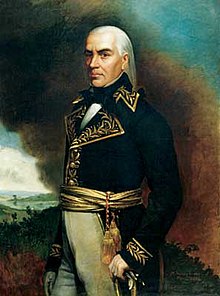Francisco de Miranda
| Francisco de Miranda | |
|---|---|

Portrait by Martín Tovar y Tovar
|
|
| Supreme Chief of Venezuela | |
|
In office 25 April 1812 – 26 June 1813 |
|
| Preceded by | Francisco Espejo |
| Succeeded by |
Simón Bolívar (As President of the Second Republic of Venezuela) |
| Personal details | |
| Born |
Sebastián Francisco de Miranda y Rodríguez de Espinoza 28 March 1750 Caracas, Venezuela |
| Died | 14 July 1816 (aged 66) Cádiz, Spain |
| Nationality | Venezuelan |
| Profession | Military |
| Military service | |
| Nickname(s) |
The Precursor The First Universal Venezuelan The Great Universal American |
| Allegiance |
|
| Years of service | 1771–1812 |
| Rank | Generalissimo |
| Battles/wars |
American Revolutionary War French Revolution Siege of Melilla (1774) Venezuelan War of Independence |
Sebastián Francisco de Miranda y Rodríguez de Espinoza (March 28, 1750 – July 14, 1816), commonly known as Francisco de Miranda (Spanish pronunciation: [fɾanˈsisko ðe miˈɾanda]), was a military leader and Venezuelan revolutionary. Although his own plans for the independence of the Spanish American colonies failed, he is regarded as a forerunner of Simón Bolívar, who during the Spanish American wars of independence successfully liberated much of South America.
Miranda led a romantic and adventurous life in the general political and intellectual climate that emerged from the Age of Enlightenment that influenced all of the Atlantic Revolutions. He participated in three major historical and political movements of his time: the American Revolutionary War, the French Revolution and the Spanish American wars of independence. He described his experiences over this time in his journal, which reached to 63 bound volumes. An idealist, he developed a visionary plan to liberate and unify all of Spanish America, but his own military initiatives on behalf of an independent Spanish America ended in 1812. He was handed over to his enemies and four years later, died in a Spanish prison.
Miranda was born in Caracas, Venezuela Province, in the Spanish colonial Viceroyalty of New Granada, and baptized on April 5, 1750. His father, Sebastian de Miranda Ravelo, was an immigrant from the Canary Islands who had become a successful and wealthy merchant, and his mother, Francisca Antonia Rodríguez de Espinoza, was a wealthy Venezuelan.
Growing up, Miranda enjoyed a wealthy upbringing and attended the finest private schools. However, he was not necessarily a member of high society; he faced some discrimination due to his Canarian roots, and his heritage was continually put into question by the Criollo aristocracy.
...
Wikipedia
